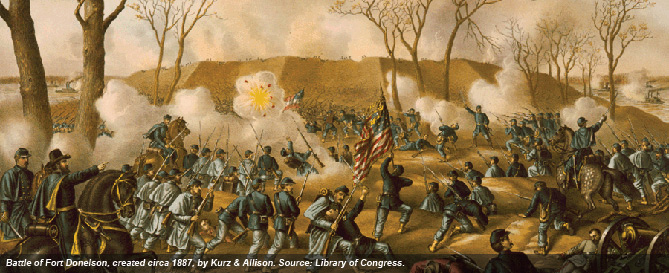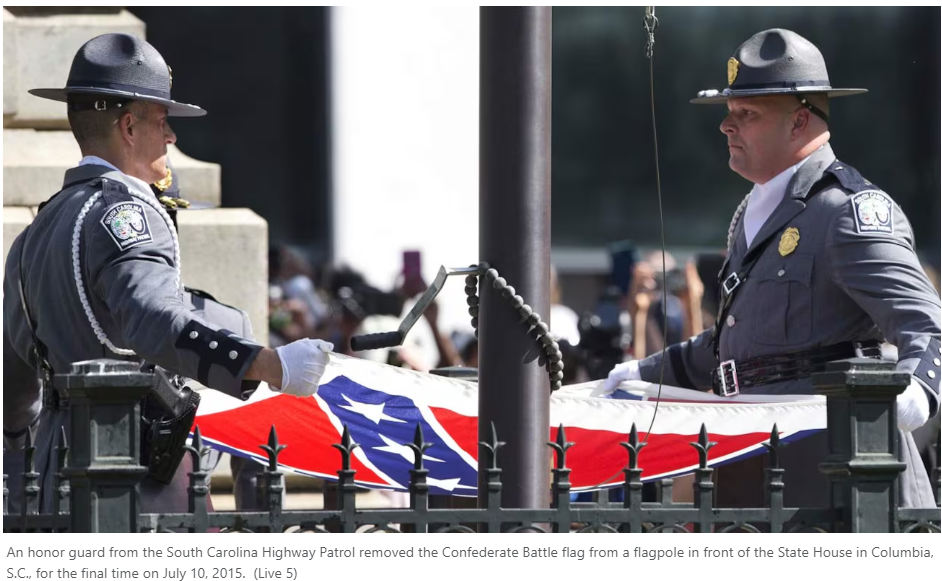On Aug. 1, 1860, an article in the Chicago Tribune proclaimed, “Great doings in Warren County.” The reporter recounted the immense surge in political support for the Republican presidential candidate, Abraham Lincoln, in the northwest farm regions. At a flagpole raising near Monmouth, pro-Lincoln speakers fulminated by the hour to “enthusiastic shouts” from a large crowd. In neighboring Henderson County a flood of 5,000 people, including hundreds arriving by steamboat from Iowa, crowded into Oquawka for a Republican rally later that month.
A farmer in Spring Grove named Mitchel A. Thompson most likely attended the Lincoln flag raising. Thompson eventually enlisted in the 83rd Illinois Infantry Regiment from which, on March 28, 1863, he penned a searing political statement that voiced his Union sentiments. His words strongly speak to the issue of why the Northern people were willing to wage a protracted, body-piling war to suppress the rebellion.
The forces that created the political culture in northwest Illinois had been building for years. During the 1850s, a new Republican Party alliance was struck between Western free farmers and Eastern industrialists, in large part because of the Erie Canal, steamboats and the railroads.
Rapid transport brought to the Midwest settlers of New England stock, who embodied Puritan values of morality, purposefulness, education and hard work. They were joined by other ambitious, antislavery migrants, notably those of Scots-Anglo-Irish descent converging from the Middle Atlantic and border states, as well as German, Scandinavian Irish and British immigrants.
Migrants from Southern and border states had moved north to escape the poverty imposed on poor whites. In a stump speech, the future governor Richard Ogilvy told how, as a young laborer in Kentucky, he could charge only $6 a month, lest he lose out to slave labor, which could be rented out at $75 a year.
In the secession winter of 1861, the Confederacy closed the lower Mississippi River to Northern commerce, catapulting the Midwest into a recession. Huge farm surpluses mounted and corn and hog prices plunged. The economic straits hardened the states’ population further against the South. As Attorney General Edward Bates wrote, “It is not politically possible for any foreign power to hold the mouth of that river against the people of the middle and upper” Mississippi River Valley.
There was a cultural component as well. The Rev. Charles Beecher believed that a slave culture would crush Bible-reading, education and the Christian family. Following the passage of the Kansas-Nebraska Bill, which opened the territories to slavery: the question, he said, ceased “to be whether black men are forever to be slaves, but whether the sons of Puritans are to become slaves themselves.”
These factors combined to swirl a perfect storm of political opposition to a Southern elite who seemed determined to ruin Midwesterners economically and spread slavery into the West. Northwest Illinois farmers’ mantra became “free territories, free homesteads, and protection to free labor.” The Democratic Party’s “open and covert hostility” to the Homestead Bill, which offered public land for settlement, was the last political straw for many. When war came farmers like Thompson, thus, fought to keep themselves free and prosperous, as well as to make slaves free.
On Aug. 1, 1862, the 42-year-old Thompson enlisted in Company B of the 83rd Illinois Infantry, which was mustered into service three weeks later. The regiment departed Cairo, Ill. for Forts Heiman, Henry and Donelson in Tennessee, where it performed garrison duties until December 1864. Confederate raiders and guerrillas were very active in the region, and the regiment also conducted expeditions locally and to other areas of Tennessee and Kentucky to counter them.
Thompson was eventually promoted to corporal. As one of his colleagues wrote, he was “prompt in the execution of his duties and conscientious in his dealings, and, as an officer, Christian, and friend, worthy of imitation and deserving of the grateful remembrance of all.”
But Thompson’s character comes through most forcefully in the March 28 letter written to his wife. In it he asserted what many fighting men from the northern Midwest were feeling, as the war neared its second anniversary, especially given the antiwar sentiments of many remaining on the home front:
We are done carrying on this war on peace principles. Our armies that are in the field are determined to prosecute this war to the bitter end. … They spurn with the utmost contempt those traitors in the north who would sell themselves and their posterity to a relentless foe that would reduce them and us to be mere vassals to a set of aristocratic slave holders and traders in human flesh whose vital principle is the few to dictate, the mass to serve.
Thompson related that he had had a “considerable of an argument” with a Texas prisoner. Thompson was trying to learn whether his cousin, who had moved to Texas, might be in a Confederate unit. If he were, Thompson believed, he must be a draftee – no way that an Illinois man would volunteer to for the South. But the Texan said no, that in Texas the men from the North were among the strongest advocates for the Southern cause.
Thompson responded that the opposite held true in his neighborhood. The Southern families he knew were the strongest in opposition to the Rebellion. Thompson wrote that they, like thousands of others in the “Deep North,”
look upon slavery as a curse to mankind, a curse to society both in a civil and religious sense. In rearing up families in luxury and ease with a domineering spirit, lounging in idleness and vice, frowning on anyone who should do anything for themselves, looking upon those that would cook a meal’s victuals or would curry his own horse ignominious.
This class hates slavery. They have a conscience. They see the evil that slavery places on society. They flee from it as they would flee from the wrath to come. They move North to a land where universal freedom prevails, where labor is looked upon as meritorious, where all are permitted to read the Bible, where all are on an equal footing in regard to procuring an education, where all can worship God according to the dictates of their own consciences and where the Wealth is with the masses and not with the favored few. Such is the class that moves North and they are opposed to this rebellion from the fact that it strikes at the very root of the society that they have moved North in search of and because the South is waging this war to break down free institutions and establish a government with slavery as its base and that the few should lord it over the masses.
Thompson was speaking as much for himself as for others. If the Union war effort didn’t begin with an ideology, by early 1863, following the issuance of the final Emancipation Proclamation, “freedom” for all citizens surely became the Northern watchword. Federal arms were protecting blacks, and no longer would Northerners fear becoming “white serfs of Southern nobility.” As a Massachusetts private wrote his wife, “‘I do feel that the liberty of the world is placed in our hands to defend and if we are overcome then farewell to freedom.’”
Mitchel Thompson did not survive the war. On Aug. 20, 1864, he was in a unit that escorted a telegrapher near Fort Donelson to repair a line. A squad of 11, including Thompson, detached to seek out local guerrillas. They were attacked by more than 100 drunken guerrillas. The Union men fought fiercely; most refusing to surrender, even after their ammunition ran out. They were killed regardless. One soldier was carried wounded into a home by local women and murdered on the couch where he was laid. Only four of the men survived to tell the story. One was Marion Morrison, actor John Wayne’s grandfather. Mitchel Thompson was last seen alive, behind a tree reloading his rifle.
C. Kay Larson is a member of the board of the New York Military Affairs Symposium and the author of “Great Necessities: The Life, Times, and Writings of Anna Ella Carroll, 1815-1894 and “South Under a Prairie Sky: The Journal of Nell Churchill, U. S. Army Nurse and Scout.”




